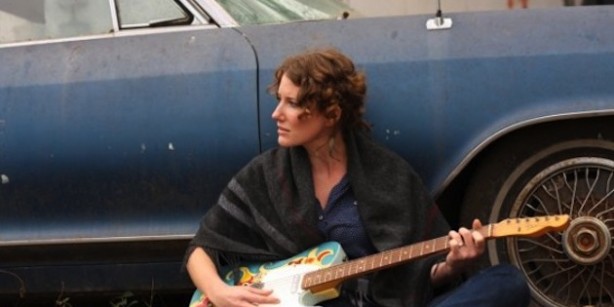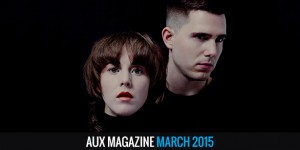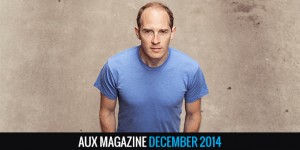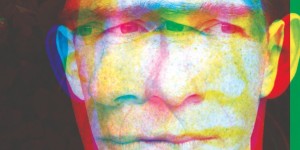 Music
Music
Q & A: Kathleen Edwards on the inner battle of 'Voyageur,' her famous relationship with Bon Iver, and her new chapter
by Nicole Villeneuve
January 24, 2012
You can call it the break-up record, but Kathleen Edwards says her new album is, more than anything else, about making choices.
Much has been made about Voyageur‘s catalyst—Edwards’ divorce from musician and band member Colin Cripps—and even more has been made of its silver lining, the new love Edwards found with the album’s producer, Justin Vernon, known to the world now for that name too, but better known, still, as Bon Iver.
“It’s a double-edged sword,” Edwards tells AUX, thankful for the exposure Vernon’s involvement has yielded but protective of the nearly ten years she’s put in making other successful records. “There are times when you do feel, like, ‘oh, is this person only interested in my project because I’m somebody’s girlfriend?’ That feels bad.”
Voyageur is a means of more change for Edwards, too; its lush, subtle pop flourishes see her breaking out of the roots-rock singer/songwriter mold she’d built for herself and, under the guise of some slicker production, taking a long look inward, making choices, and planting new roots.
We spoke with Edwards in Toronto after she returned home from New York about the inner battle of Voyageur, her famous relationship, and her new chapter.
AUX: How did it feel to get the new stuff ready to play?
Kathleen Edwards: Every day leading up to the actual first rehearsal day was the most anxious I’ve ever been. Then when we started rehearsing it went great, and it’s been amazing. It’s been a lot of work. We tried out some songs previously as a band, but a lot of the songs were done in the studio, as opposed to forming them as a live band first.
Was the anxiety leading up to it purely a performance thing, or was it because the stuff you’ll be playing is really personal?
I think that’s been a huge part of it, yeah. It’s been a bit ‘holy shit.’ Having a guitar in your hands and playing the songs and playing music with other people is the thing that’s actually helped quash a lot of those anxious feelings, to be honest. But yeah, I think, I just put a lot of my feelings into it, and I feel a little bit like, holy shit, that’s a lot of stuff for other people to hear and dissect and interpret. It’s inevitable and my own fault. But definitely there’s been some ‘oh shit, what did I do.’
Did you have any reservations about that, making the album?
When I was making the record I didn’t think of it too much like that. I was talking to my best friend today about it, and she said, as best friends do, being protective, that people falsely interpret some of the sources of this stuff. And we were talking about how people don’t give me enough credit—not that people don’t give me credit—but that you forget when you’re actually talking about how personal a record is, that there’s actually a huge component of your imagination that plays a huge part in songwriting. There are some songs where people want to know who it’s about, or they think it’s about someone specific, when actually, it’s a scene that’s playing out in my imagination sometimes. Sometimes you lose sense of that, that there’s a certain amount of fiction with all the non-fiction of the record.
Do you find in helping people interpret that or protect that that you can lose sight of that too?
Oh for sure I do! Sometimes you do. Some people feel like their personal life is off boundaries in terms of this type of dialogue. And there are days when I think, my songs tell my stories, I don’t have to tell it again. At the same time, the most fruitful and inspired I feel, the people who are role models or inspirations to me, are the people who are capable of actually being really open. It’s a pretty brave thing to be. So I decided I would launch headfirst into just being open and honest about where this shit comes from. Then there are days you wish you could just tell someone that the song tells the story, and everything else is between you want to hold on to and protect.
This is being touted as your divorce album, but I feel like the bigger picture of your life, and yourself, sort of being reevaluated, is being a bit overlooked in that.
Yeah. This isn’t a record about a marriage falling apart, it’s about finding love again. It’s about all of the things that make you question where you are at in your life. For me, anyway. It’s taken some time to have that perspective, because when you’re making a record you’re not necessarily thinking about the bigger picture, and the underlying themes that run through it, you’re just wanting to do each song the best justice you can in a recording. But yeah, I think this record’s about starting a new chapter in your life and acknowledging it and having to answer some pretty hard questions about where you want to go and how you want to get there. Obviously relationships play a huge part in that, but obviously they’re not everything.
Those periods of massive change are usually preceded by a looming bad feeling for a while. Was there discomfort with yourself for a while?
A lot, yeah. There have been lots of times where I felt like I was swimming upstream in a current that I built. And there have been moments of being in a raft and you’re flowing downstream full-speed ahead, and it’s the greatest feeling in the world. It’s like a roller coaster ride. There are days you wake up and you don’t feel like yourself, and you’re wondering what’s wrong with me? Why am I feeling uncertain about what my future is when five years ago everything seemed like it was on track? And then there are days when it’s a party, and the future is unknown and that’s the best part about it, and you feel like you’re going to fit yourself into it. That weird balance between planned and unplanned, or certainty and uncertainty, and faith and lack of faith. I think everyone stands back and re-evaluates.
Sound-wise, this album is new in ways for you too. I can think back to “Goodnight, California,” as the last song from the last album [Asking For Flowers], as a sort of prequel to this direction.
Yeah. I didn’t really have that perspective at the time, but it did feel like a really natural transition. I don’t really feel like this is that big a departure so much as I think I was able to broaden or build on ideas that were bubbling there for a little bit. I had a better understanding of what I was going to try to achieve this time from the beginning, as opposed to figuring it out as I was going. Having said that, I think recording is always a process of trial and error, and I was lucky enough that every time I tried something that didn’t work the way I wanted to hear it, I had the opportunity to go back and try again till I got it the way I wanted it.
And the people that you worked with on the album have a large role in that?
Oh god, yeah. I think in every record, for sure, my sound is a culmination of all these people who participated in making the record. I’m always reluctant to take credit for the fact that it is a very collaborative process. It always has been. But on this record particularly there were a couple of people who played key roles. My band certainly did, again. There were a few changes in my band. I had a different drummer this time, a Toronto guy named Lyle Molzan, who certainly played a huge role in helping me get the right arrangements and the right groove for a lot of songs that I hadn’t quite figured out yet. And Jim Bryson, my longtime friend and bandmate, he definitely threw some cool ideas at the wall that helped direct that sound the way I wanted it to go. Phil Cook was an old bandmate of Justin [Vernon]’s, and an old friend of his who is a keyboard player. He came and played a lot of keyboards on this record and tracked some parts that really shaped things early on. And of course Justin is, creatively, a huge influence on where this went.
I was excited when I first heard he was working on the album with you. Did you worry that your personal relationship with him would change how people would approach the album at all?
It’s definitely been a challenge to accept the tone under which that stuff exists. I mean, the truth is, it’s a double-edged sword. I’m not the kind of person who objects to stuff like that being printed. It’s factual and it’s honest and it’s real, it’s out there, and he obviously has a lot of people paying attention to what he’s doing, and he’s equally as open and honest about how he feels and who he is. But there are times when you do feel, like, ‘oh, is this person only interested in my project because I’m somebody’s girlfriend?’ That feels bad. And sometimes it does feel like there’s an imbalance in peoples’ attitude towards that, especially in the gender department. If I were the one who was far more well-known, I don’t think people would be as quick to say ‘well, she’s working on his record because they’re dating.’ There’s a certain amount of the lifestyle we do, playing music, where there is no real separation between personal and professional. Musicians are musicians all the time, and their lifestyle is based around that. I think that’s why we get a lot really well and why it worked out. At the same time, you do wonder if there are people saying ‘he probably only worked on her record because they’re dating.’ Well, maybe that’s nobody’s place to say. (Laughs)
On the other hand, have you also found that his profile and him working on the record has brought a new audience to your music?
Yeah, and it’s absolutely a gift. No doubt there are people hearing me for the first time with open minds and maybe even people who thought they had heard my name before and had a preconceived idea of what I sounded like, and they weren’t interested in listening, and how that he’s involved, for sure, I’d be lying to myself if I didn’t acknowledge that more doors are open because of him. But I also am really proud of the fact that I’ve been making records for ten years. And I’d like to believe that the reason we ended up working together in the first place is because he was a fan of what I did, and I have to hold on to that so that I don’t feel like I’m just somebody’s girlfriend.
It’s been nice to see that, at least in Canadian media, it is being approached as ‘this is another good step and a new story in Kathleen Edwards’ career,’ and not ‘oh she worked with a celebrity producer.’
It does make me feel very safe, and happy to be Canadian. There’s a very rewarding feeling, a validating feeling, when my home country, or even just media in Toronto or Ottawa or wherever I consider home to be, they’ve always been very nurturing and supportive of me, and it doesn’t feel like this has been any different. And that means the world to me. It makes me feel like I’m part of something here, and I have been for a long time.
And you worked with John Roderick [Long Winters] on this album a bit too, who I’m also a big fan of.
Oh, cool, yeah. John got involved early on, and really sparked this feeling of like, ‘I think you’re ready to step outside this box that you’ve been contently living in. Get those other ideas percolating outside.’ He really encouraged me to go for that. That’s when it really started going.
Do you feel like you made the album you wanted? The one you could feel for a while?
Yeah. I’ve been talking about this record a lot in the past two weeks and I feel like an asshole every time I say it because the more you say it it almost waters it down, but in the first few interviews I did, it came very easy for me to say this was the hardest thing I’ve ever done, making this record, creatively and personally. Because I really had to fight myself. You get into patterns, you get into habits of making music that feels good and works. I’ve been very lucky that I’ve been able to keep putting out records and be supported by a fan base and my friends and record company, and I’ve been able to tour, and all that stuff. But there was something un-evolved about where I was at, I was ready to take on more. It’s hard to change things up when you’re the person who has to make that happen. It’s hard to fall out of your comfort zone. And you can’t necessarily always articulate what you’re looking for, but you know it’s something different. And I have a lot of trial and error, a ton of it, and I went back to the drawing board a lot, and I fought with songs that I knew the ideas were good, but what I was hearing was the same was so frustrating. I stuck with it, and I credit all the people that helped me get there, but I also, I really fought myself, and I won (laughs). I beat myself. And I feel like it was the best fight I ever gave. I feel really rewarded in myself.
I think whenever you confront yourself like that, what results, at least ideally, is honesty, and you can hear that here.
Cool. For all the relationship talk, it’s certainly more about me looking in the mirror and being like, it’s not there yet. Got some work to do (laughs).
Tags: Music, Interviews, News, AUX Magazine, bon iver, Justin Vernon, Kathleen Edwards





